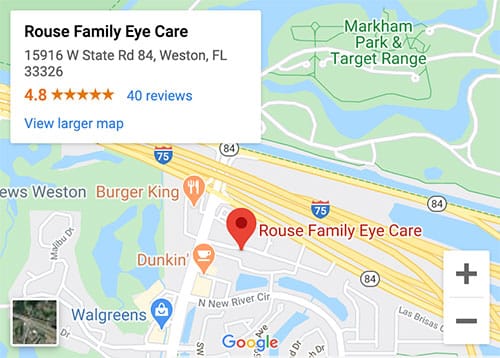At Rouse Family Eye Care, we provide full-service optometry services to residents of Weston, FL, and surrounding communities. As well as scheduled appointments, we accept patients on an emergency basis. Our patients know they can count on us to provide customized personal service and that their well being is our top priority. We pride ourselves in keeping current on new treatments and information concerning all aspects of eye health, including macular degeneration. Here’s what you need to know about this condition:
What is Macular Degeneration?
Macular degeneration affects an estimated 10 million people in the U.S. and is the leading cause of significant vision loss and total blindness. Macular degeneration refers to the deterioration of the macula, which is the central part of the retina. The retina is the tissue at the back of the eye that processes light in order to form visual images.
What Are the Symptoms of Macular Degeneration?
One of the first symptoms of macular degeneration is generally blurred vision. However, that can also be an indication of several other types of ocular conditions, such as cataracts, glaucoma, diabetic retinopathy, and trauma to the eyes, so blurred vision alone isn’t necessarily a reason to suspect that macular degeneration is the culprit. Other symptoms that help identify the condition include linear lines, such as text in books, magazines, or websites appearing wavy, enhanced sensitivity to glare, difficulty reading or otherwise discerning details in low light conditions, and blurry areas when looking at a printed page or other flat surface. Eyesight loss begins with the center of the eyes and progresses outward.
Who is at Risk of Getting Macular Degeneration?
The vast majority of people who get macular degeneration are over the age of 60. However, age isn’t the only risk factor involved with this condition. Those who smoke tobacco products are also at elevated risk, and people who have a long history of neglecting to wear eye protection are also thought to be at higher risk of developing age-related macular degeneration. You may also be more susceptible to this condition if you are overweight, particularly if you tend to carry your extra pounds in your abdomen area. There is also substantial evidence that predisposition to developing macular degeneration has a genetic component. Other conditions such as cardiovascular disease and high blood pressure are also believed to contribute to the risk of developing macular degeneration.
Studies suggest that women are more susceptible to the development of macular degeneration, but this appears to be due their average lifespan being longer than that of their male counterparts. Light-colored irises also seem to be a risk factor as well as being far-sighted.
How is Macular Degeneration Tested and Diagnosed?
Various tests are performed to diagnose and track progression of Macular Degeneration. One of the newest technologies used in early detection of Macular Degeneration is Adapt Dx. The Adapt Dx tests for rod intercept timing (RI), which is the time it takes your vision to adjust to low-light environments. The results provide your doctor with critical information when it comes to diagnosing Macular Degeneration as difficulty in low light is one of the earliest symptoms. Adapt Dx is recommended if you have one or more risk factors for developing Macular Degeneration. For more information on Adapt Dx feel free to contact our office with any questions or concerns.
The following link is a video reviewing what to expect when being tested with Adapt Dx:
How is Macular Degeneration Treated?
Medical science has yet to find a cure for macular degeneration. However, with early detection and the right course of treatment, the progression of the disease can often be significantly slowed down. Macular degeneration treatment options include injections of anti-angiogenic drugs into the eye area, conventional laser therapy, and two-step photodynamic laser therapy.
A recent study by the National Eye Institute of the National Institutes of Health shows that certain types of vitamins and minerals may be beneficial in slowing the progression of macular degeneration. Your eye doctor may recommend supplements that include vitamins C and E, zinc, copper, and beta-carotene. Smokers or former heavy smokers may benefit from the addition of lutein, Omega-3 acids, and zeaxanthin.
Please feel free to reach out to our office at your convenience if you have questions or concerns about macular degeneration or any other issues related to eyesight or general ocular health.

954-384-6200
